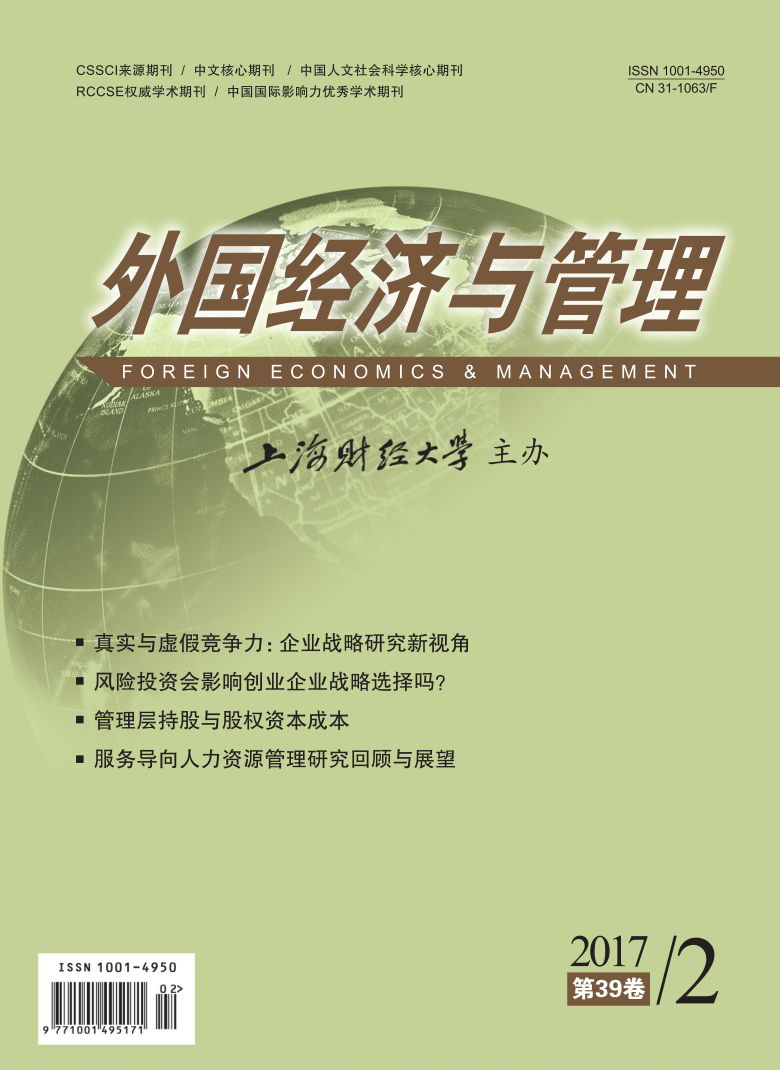随着中国经济快速发展,以知识信息共享和合作互补为基础的战略联盟受到越来越多科技型小微企业的青睐,成为小企业在竞争环境中通常采用的发展模式。本研究借助文献回顾、问卷调研和实证分析探讨当前科技型小微企业联盟伙伴选择因素对联盟绩效的影响,尤其是伙伴关系在两者之间的中介效应。研究发现:联盟伙伴选择因素正向影响联盟绩效,伙伴关系对联盟绩效有显著的正向影响作用,伙伴关系在联盟伙伴选择因素与联盟绩效两者间起部分中介作用。研究表明:小微企业在选择联盟的方式发展时,高度重视合作伙伴的企业声誉、资源技术互补与企业兼容性三个特质。同时,要求加强合作伙伴的信息沟通,提高联盟信任水平,从而达到促进联盟和谐稳定发展。本文通过实证研究,证明了联盟伙伴选择对联盟绩效的影响机制,不仅拓展了科技型小微企业组建联盟战略的理论基础,对于联盟内企业选择合作伙伴也具有现实意义。
联盟伙伴选择、伙伴关系与联盟绩效——基于科技型小微企业的实证检验
摘要
参考文献
4 郭焱, 刘月荣, 郭彬. 战略联盟中伙伴选择、伙伴关系对联盟绩效的影响[J]. 科技进步与对策, 2014,(5):25-29.
10 杨东奇, 张春宁, 徐影, 等. 企业研发联盟伙伴选择影响因素及其对联盟绩效的作用分析[J]. 中国科技论坛, 2012,(5):116-122.
11 杨锐, 夏彬. 网络关系构建及其对企业成长绩效影响研究[J]. 科研管理, 2016,(5):103-111.
13 Anderson J C, Narus J A. Partnering as a focused market strategy[J]. California Management Review, 1991, 33(3):95-113. DOI:10.2307/41166663
14 Burchell B, Wilkinson F. Trust, business relationships and the contractual environment[J]. Cambridge Journal of Economics, 1997, 21(2):217-237. DOI:10.1093/oxfordjournals.cje.a013667
15 Capaldo A, Petruzzelli A M. Partner geographic and organizational proximity and the innovative performance of knowledge-creating alliances[J]. European Management Review, 2014, 11(1):63-84. DOI:10.1111/emre.12024
16 Cholakova M. Comment on "alliance governance and performance in SMEs:Matching relational and contractual governance with alliance goals" by Pittino and Mazzurana(2012)[J]. Entrepreneurship Research Journal, 2013, 3(1):130-133.
17 Claycomb C, Frankwick G L. A contingency perspective of communication, conflict resolution and buyer search effort in buyer-supplier relationships[J]. Journal of Supply Chain Management, 2004, 40(1):18-34. DOI:10.1111/jscm.2004.40.issue-1
18 Das T K, Teng B S. Instabilities of strategic alliances:An internal tensions perspective[J]. Organization Science, 2000, 11(1):77-101. DOI:10.1287/orsc.11.1.77.12570
19 Drewniak R. The role of the due diligence process in the selection of partner companies in a strategic alliance[J]. Studia I Materialy Polskiego Stowarzyszenia Zarzadzania Wiedza, 2013,(67):5-17.
20 Doloi H. Relational partnerships:The importance of communication, trust and confidence and joint risk management in achieving project success[J]. Construction Management and Economics, 2009, 27(11):1099-1109. DOI:10.1080/01446190903286564
21 Fama E F. Agency problems and the theory of the firm[J]. Journal of Political Economy, 1980, 88(2):288-307. DOI:10.1086/260866
22 Geringer J M. Strategic determinants of partner selection criteria in international joint ventures[J]. Journal of International Business Studies, 1991, 22(1):41-62. DOI:10.1057/palgrave.jibs.8490291
23 Gulati R. Does familiarity breed trust? The implications of repeated ties for contractual choice in alliances[J]. Academy of Management Journal, 1995, 38(1):85-112. DOI:10.2307/256729
24 Hudlund G. A model of knowledge management and the N-form corporation[J]. Strategic Management Journal, 1994, 15(S2):73-90.
25 Inkpen A C, Currall S C. The coevolution of trust, control, and learning in joint ventures[J]. Organization Science, 2004, 15(5):586-599. DOI:10.1287/orsc.1040.0079
26 Killing J P. How to make a global joint venture work[J]. Harvard Business Review, 1982, 60(3):120-127.
27 Krishnan R, Martin X, Noorderhaven N G. When does trust matter to alliance performance[J]. Academy of Management Journal, 2006, 49(5):894-917. DOI:10.5465/AMJ.2006.22798171
28 Lau H C W, Wong E T T. Partner selection and information infrastructure of a virtual enterprise network[J]. International Journal of Computer Integrated Manufacturing, 2001, 14(2):186-193. DOI:10.1080/09511920150216305
29 Lavie D, Haunschild P R, Khanna P. Organizational differences, relational mechanisms, and alliance performance[J]. Strategic Management Journal, 2012, 33(13):1453-1479. DOI:10.1002/smj.2012.33.issue-13
30 Lin Z A, Yang H B, Arya B. Alliance partners and firm performance:Resource complementarity and status association[J]. Strategic Management Journal, 2009, 30(9):921-940. DOI:10.1002/smj.v30:9
31 Lyles M A, Salk J E. Knowledge acquisition from foreign parents in international joint ventures:An empirical examination in the Hungarian context[J]. Journal of International Business Studies, 2007, 38(1):3-18. DOI:10.1057/palgrave.jibs.8400243
32 Morgan R M, Hunt S D. The commitment-trust theory of relationship marketing[J]. Journal of Marketing, 1994, 58(3):20-38. DOI:10.2307/1252308
33 Nonaka I. A dynamic theory of organizational knowledge creation[J]. Organization Science, 1994, 5(1):14-37. DOI:10.1287/orsc.5.1.14
34 Parkhe A. Strategic alliance structuring:A game theoretic and transaction cost examination of interfirm cooperation[J]. Academy of Management Journal, 1993, 36(4):794-829. DOI:10.2307/256759
35 Quintas P, Lefrere P, Jones G. Knowledge management:A strategic agenda[J]. Long Range Planning, 1997, 30(3):385-391. DOI:10.1016/S0024-6301(97)90252-1
36 Van Beers C, Zand F. R&D cooperation, partner diversity, and innovation performance:an empirical analysis[J]. Journal of Product Innovation Management, 2014, 31(2):292-312. DOI:10.1111/jpim.2014.31.issue-2
37 Zollo M, Reuer J J, Singh H. Interorganizational routines and performance in strategic alliances[J]. Organization Science, 2002, 13(6):701-713. DOI:10.1287/orsc.13.6.701.503
引用本文
吴松强, 曹刘, 王路. 联盟伙伴选择、伙伴关系与联盟绩效——基于科技型小微企业的实证检验[J]. 外国经济与管理, 2017, 39(2): 17–35.
导出参考文献,格式为:






 8075
8075  8167
8167

